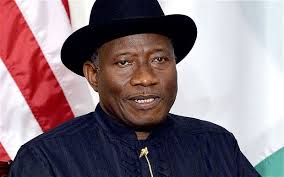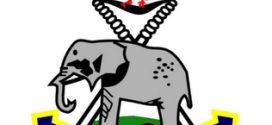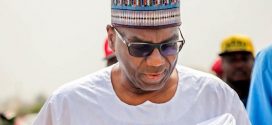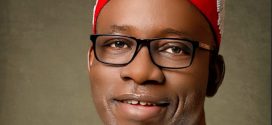(Bloomberg) — It’s Friday evening and a group of Nigerian train staff scream at each other as they battle to get power working on a revived cross-country service from Lagos to Kano, the nation’s two largest cities.
Related Stories
Rolling out of Nigeria’s southern commercial hub more than eight hours late, plain-clothed policemen cock their AK-47 assault rifles as they try to push back young men launching themselves onto the carriages to hitch illegal rides as the train chugs through Lagos’ shantytowns. It breaks down repeatedly, and power to the air-conditioned sections cuts out permanently a third of the way through the 42-hour trip, leaving everyone sweaty and coated in dust and grime.
“It’s not fixed — this is Nigeria,” said Mohammad Khalled, a 21-year-old student heading to the central city of Minna, on his first train ride as a safer and cheaper alternative to the badly maintained road network.
Restarting the train service in December 2012 after more than a decade of inconsistent service along the 1,126-kilometer (699-mile) track traversing the length of Africa’s most populous nation is one of the achievements touted by President Goodluck Jonathan’s People’s Democratic Party before elections next month. Other gains include the sale of power utilities to private investors and fertilizer subsidy reform. Many of these reforms, like the train line, haven’t gone smoothly.
More from Bloomberg.com: UBS Client Claims Losses on Currency Product Probed by US
The elections themselves were delayed from Feb. 14 to March 28 after Jonathan’s security adviser said the military couldn’t ensure a safe vote because it was planning an offensive against the Islamist militant group Boko Haram in the northeast.
Jonathan’s Shortcomings
The opposition All Progressives Congress led by Muhammadu Buhari, a 72-year-old Muslim northerner and former military ruler, has sought to capitalize on the perceived corruption and security shortcomings of Jonathan, a Christian and member of the ethnic Ijaw minority from the oil-rich south.
More from Bloomberg.com: Nexon CEO Says Revenue From Games Remains `Strong’
An almost 50 percent crash in oil prices last year exposed the nation’s crude-dependent finances and sent the naira tumbling 18 percent against the dollar in the past six months. Nigeria’s benchmark stock index has dropped 27 percent this year in dollar terms, the world’s worst performer after Ukraine, according to data compiled by Bloomberg.
Jonathan’s campaign posters urge Nigerians to vote for continuity and to “move forward” under the PDP, which has governed since the return to civilian rule in 1999. Buhari’s campaign uses the APC party symbol of a broom to promise change from corruption and insecurity.
Buhari has pledged to end the war against Boko Haram, which Yvonne Mhango, a sub-Saharan Africa economist at Renaissance Capital, called “a stain on Jonathan’s record that wasn’t resolved and escalated.”
Worsening Conflict
As the train sat stuck in the southern city of Osogbo, waiting for a new engine being sent up from Ibadan after a breakdown, Bashir Raji Itopa, a 26-year-old economics student heading to Minna in second class, said he’s concerned about the worsening conflict.
He quit studying in the northeastern city of Maiduguri because of Boko Haram’s attacks in the region. The Islamist group, which has declared a caliphate the size of Belgium in Nigeria’s northeast, killed at least 1,600 people in January, Bath, U.K.-based risk consultancy Verisk Maplecroft, said in a Feb. 11 report. More than 4,700 people died last year in militant raids, double the number in 2013, according to the consultancy.
“The death toll is piling up by the days and weeks and it’s like it can’t be controlled,” Itopa said, sitting on a curb by the station as hawkers worked their way up and down the platform in the morning sun. “I’ll vote for change, APC.”
Electricity Access
In his 2011 campaign, Jonathan, 57, who has a PhD in Zoology, vowed to bring electricity to Nigerians, the vast majority of whom live without regular access to grid power.
After selling state-owned generation plants, the government had to intervene with a $1.3 billion industry bailout in September, while demand still far outstrips supply.
“Has it been meaningful for the average person in terms of an increase in power supply to the grid and the cost of power? No, not as yet,” Mhango of Renaissance Capital said by phone from Johannesburg.
A Petroleum Industry Bill has languished in parliament for six years, deterring investment in the oil and gas industry of Africa’s biggest crude producer.
Waning Popularity
While the PDP has the power of the incumbency, patronage networks and state apparatus, Jonathan’s “overall popularity has waned given what many believe is an inadequate response to the threat posed by Boko Haram and his general inability to tackle widespread corruption,” RBC Capital strategists, led by Helima Croft in New York, wrote in a Feb. 4 report.
Even as Jonathan’s party said it would run an issues-based campaign, it’s sought to portray Buhari as an Islamist extremist and has questioned the authenticity of his secondary school certificate, allegations the opposition leader has denied.
During elections, politicians whip up regional and religious sentiments in a country that has as many as 250 ethnic groups and is almost evenly split between a largely Christian south and a predominately Muslim north.
Buhari, who ruled between 1983 to 1985 after instigating a coup and is running in his fourth presidential campaign, is wooing voters in the south outside his northern power base. His backers say his earlier stint in power before he was toppled by another military putsch showed him to be uncompromising on corruption and security.
Tight Election
The election is set to be the tightest ever, with both parties garnering 42 percent support among likely voters, according to an Afrobarometer poll released Jan. 27.
“It’s going to be a very close election,” Jideofor Adibe, a senior lecturer of political science at Nassarawa State University, said in a phone interview. “The greatest threat to the Jonathan administration isn’t the APC per se, but the re-invention of Muhammadu Buhari.”
As the train came toward the outskirts of northern Kano, Obinna Chibuike, a first time rider and goods distributor traveling from Ibadan, said that despite his disappointment with the railway’s shortcomings, his vote is for Jonathan.
“I still wanted to see the Nigeria train, they said it had been revived,” the 26-year-old said. “I haven’t seen complete change, but the little I’ve seen, I’m impressed.”
To contact the reporter on this story: Chris Kay in Kano at [email protected]
To contact the editors responsible for this story: Antony Sguazzin at [email protected] Karl Maier, Michael Gunn
 Hottestgistnaija.com
Hottestgistnaija.com





